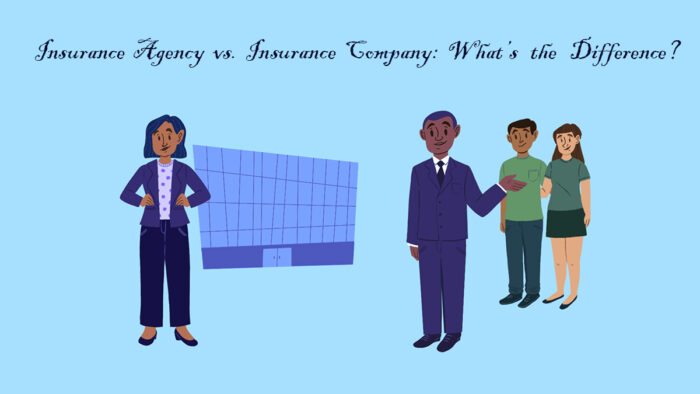Let’s say you’re shopping for small business insurance and trying to figure out the difference between an insurance company and an insurance agency. They may seem similar, but they’re actually quite different.

The key difference is this: an insurance company creates and backs the insurance policies and pays claims when needed. On the other hand, an insurance agency doesn’t underwrite policies; they act as a middleman, helping you find and purchase insurance from various companies. The agency earns a commission by selling you a policy.
So, when you’re searching for the right insurance, you have two ways to go. You can either work directly with an insurance company or go through an insurance agency. In this article, we’ll explain the differences between the two to help you make the right choice.
Insurance Company vs. Insurance Agency: Meaning
Insurance Company
An insurance company, also known as an insurance carrier, is the business that provides and backs an insurance policy. They are responsible for creating the policy, collecting monthly payments (called premiums) from the customer, and paying out on any valid claims.
For instance, companies like Progressive, Nationwide, Allstate, Liberty Mutual, and Travelers are well-known insurance providers that offer coverage for things like homes and cars. They are the ones that actually stand behind the policy and handle claims when something goes wrong.
How Do They Work?
Just as I have mentioned above, an insurance company handles everything from selling policies to managing claims. If you buy directly from an insurance company, known as a direct writer, you deal with one organization for the entire process. They create the policy, collect your payments (premiums), and are responsible for paying out claims if needed.
There are two types of insurance companies: policyholder-owned mutual companies and shareholder-owned corporations. Both are regulated by the government to ensure they have enough money to meet their responsibilities. While buying directly from an insurance company can be simple and straightforward, it’s up to you to compare plans and choose the right one for your needs.
Insurance Agency
An insurance agency, or agent, helps people find and buy insurance policies but doesn’t actually create or underwrite them. Instead, they act as a middleman, connecting buyers with insurance companies and earning a commission for each sale.
We have two types of insurance agencies:
- Independent agents: These individuals work with multiple insurance companies that offer different policies to locate the best fit for each of their customers.
- Exclusive (or captive) agents: These agents only sell policies from one specific insurance company.
Independent agents generally offer more options because they aren’t limited to one insurer, helping customers get the best possible coverage for their needs.
Key Differences between Insurance Company and Insurance Agency
Now, let’s take a look at the key difference between insurance companies and agencies:
- An insurance company creates and manages the policies, while an insurance agency sells policies to customers.
- Insurance companies take on the financial risk of providing coverage. On the other hand, agencies do not take on any financial risk but help customers navigate their options.
- Carriers generally offer only their own products. Independent insurance agencies, on the other hand, can offer products from different companies, giving customers more choice.
Insurance Company vs. Insurance Agency: Pros and Cons
Understanding the advantages and disadvantages is very important when deciding how to get the best coverage for your needs.
Pros of Insurance Company
- Tech-savvy services: Insurance companies have embraced digital tools, offering user-friendly websites, mobile apps, and online services for added convenience.
- 24/7 support: Many insurance companies are available around the clock, so you can get help anytime, even outside regular business hours.
- Widespread availability: No matter where you live, insurance companies operate in most states, making it easy to find coverage.
- Memorable ads: Insurance companies are known for entertaining commercials that often bring humor into your day.
Cons of Insurance Company
- Limited options: Since insurance companies can only offer their own policies, you might miss out on other options that better suit your needs.
- Lack of local insight: Direct-to-consumer companies may not understand specific local risks, and if you prefer face-to-face service, they may not have nearby offices.
- No personal connection: Each time you call for help or file a claim, you’ll likely speak to a different person, making it hard to build a relationship.
- No personalized shopping: Unlike brokers, agents at insurance companies don’t compare policies from other insurers to find the best deal for you; they only sell their own products.
Pros of Insurance Agency
- More choices: Insurance agencies work with different carriers, allowing them to compare options and find the best coverage at the most competitive price for you.
- Flexible pricing: Since they offer policies from multiple providers, agencies can find you better rates and help you switch if needed.
- Customer-focused: Agencies prioritize your needs, aiming to match you with the right policy instead of pushing products from a single company.
- Full-service support: Many agencies offer a variety of coverage options like auto, home, life, health, and business, so you can handle all your insurance needs in one place.
- Personal connection: You’ll work with a dedicated agent who knows your background, making it easier to handle questions, claims, and policy updates.
- Local expertise: Agencies often understand local risks and can respond to claims quickly, even in person when needed.
- Community involvement: Agencies tend to support local initiatives, contributing to schools, charities, and sports leagues in the area.
Cons of Insurance Agency
- Two relationships: You’ll be dealing with both the agency and the insurance company, which can add complexity to communication and responsibility.
- Limited availability: Agencies aren’t everywhere; they may not operate in every state or region.
- Smaller tech presence: Agencies typically have smaller technology budgets, which means they may not offer as advanced mobile apps or websites as large insurance companies.
- Limited hours: Unlike some insurance companies, agencies usually don’t provide 24/7 service, so you’ll need to contact them during business hours for help.
How Do They Work Together?
Insurance companies rely on agencies to help in distributing their products. While large companies might have their own direct-to-consumer sales channels, many prefer working with agencies because of their expertise and local customer service.
Agencies, whether captive or independent, provide personalized guidance to customers who may not understand the nuances of various insurance policies. They are compensated through commissions when they sell a policy.
Choosing Between an Insurance Company and an Agency
When it comes to buying insurance, the choice between going directly to an insurance company or using an agency depends on your needs.
If you’re looking for a wider range of options and personalized service, working with an independent agency might be ideal. If you’re confident in the company you want, you can go directly to an insurance company.
Conclusion
Understanding the difference between an insurance company and an insurance agency is crucial for making informed decisions about your coverage.
While insurance companies create and bear the financial risk for policies, agencies are there to help you find the best options.
Just as I have mentioned above, whether you choose to work with a company directly or through an agency depends on your preferences and needs.



